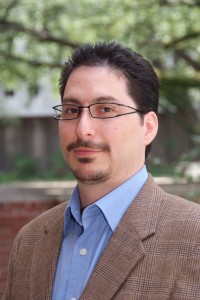Dr. David G. Ortiz
Social Movements, Civic Engagement, State Repression,Time-Diffusion of Social Processes, Political Sociology, Internet Communication Technologies (ICTs) and Digital Media, Latin America, Peace and Conflict Studies, Research Methodology

Contact Information
Office: Science Hall 289D
Phone: 575-646-2750
Email: dgortiz@nmsu.edu
Curriculum Vitae
Education
Ph.D. – University of Notre Dame, 2008
M.A. – University of Notre Dame, 2002
M.A. – University of Notre Dame, 1999
Postgraduate Diploma – Universidad Nacional Autónoma de México, 1997
B.S. –Universidad Nacional Autónoma de México, 1996
Background
Before joining the faculty at NMSU, Dr. Ortiz was a pre-doctoral fellow at the Center for the Study of Political Change at the University of Siena in Italy, and an assistant professor of Sociology and the Stone Center for Latin American studies at Tulane University. He is current co-editor in chief of Mobilizing Ideas, a leading scholarly blog that publishes interdisciplinary perspectives on social movements, social change, and the public sphere. He has also served as an international election observer in several elections throughout Latin America, including the 1994 Mexican elections with Alianza Civica, and the 2004 Venezuelan Referendum with the Carter Center and the OAS.
Research
Dr. Ortiz’s current research agenda focuses on the influence of time on contention-repression dynamics, the effects of disasters on social movements, the relationship between digital media and activism, state repression and mobilization in Latin America, and the effects of International Financial Institutions on contention in Latin America. His work has been published in Mobilization, Sociological Inquiry, Sociological Perspectives, and Qualitative Sociology, among others.
One of Dr. Ortiz’s present research projects is a largely qualitative, multi-method study examining the growth of a post-hurricane Katrina blogosphere in New Orleans, focusing on how in the weeks, months and years after the systemic levee failure, people used blogs to communicate, establish relationships, and organize a social movement to influence rebuilding efforts and the city’s civil and political institutions. Co-authored with Dr. Stephen Ostertag, this longitudinal study highlights the digitally mediated social processes linking individual civic engagement with collective civic actions. It demonstrates that the Web serves as a “virtual” mobilizing structure, enabling individuals with shared concerns to organize across time and space, without the need of co-presence or preexisting formal ties, networks, or organizations. This analysis provides insights into the development of virtual communities and social movements formed around collective identities and processes of collective efficacy that highlight the dynamics of contention in civil society.
Another of Dr. Ortiz’s current projects explores the complex relationship between contention and state repressive actions using conditional-risk set gap time models to examine daily event data from 98 countries over a fifteen year period. Unlike previous research in this area, the analyses simultaneously look at how regime type, the form of repression, and time decay all combine to affect the likelihood of contentious backlash to state repression. The results of this research highlight that there are two different types of contentious backlash to state repression – one that is structural and another that is event-time dependent. Different characteristics of regimes provide, at the structural level, an environment that conditions contentious responses to state repressive actions. At the same time, different types of state repressive actions also have significant negative effects on further contention at the event level. Those negative effects decay over time, increasing the likelihood of a backlash of contention. At a theoretical level, this research strand highlights how macro, meso, and micro level forces interact dynamically to affect repression-contention processes.
Selected Peer-Reviewed Publications
Ortiz, David G. 2015. “State Repression and Mobilization in Latin America.” Handbook of Social Movements across Latin America, edited by Paul Almeida and Allen Cordero. New York: Springer.
Ortiz, David G., and Stephen F. Ostertag. 2014. “Katrina Bloggers and the Development of Collective Civic Action: The Web as a Virtual Mobilizing Structure” Sociological Perspectives 57(1):52-78.
Ortiz, David G., and Sergio Bejar. 2013. “Participation in IMF-sponsored Economic Programs and Collective Action in Latin America, 1980-2007.” Conflict Management and Peace Science 30(5):492-515.
Ortiz, David G. 2013. “Rocks, Bottles, and Weak Autocracies: The Role of Political Regime Settings on Contention-Repression Interactions.” Mobilization 18(3): 289-312.
Ortiz, David G., 2007. “Confronting Oppression with Violence: Inequality, Military Infrastructure and Dissident Repression” Mobilization 12(3): 219-238.
Ortiz, David G., Daniel J. Myers, N. Eugene Walls, and Maria-Elena D. Diaz. 2005. “Where Do We Stand with Newspaper Data?” Mobilization 10(3): 397-419.
Courses Taught
Introduction to Sociology
Social Problems
Social Research: Analysis (Statistics)
Power and Politics in America
Social Movements
Social Movements in Latin America
Political Sociology of Latin America
